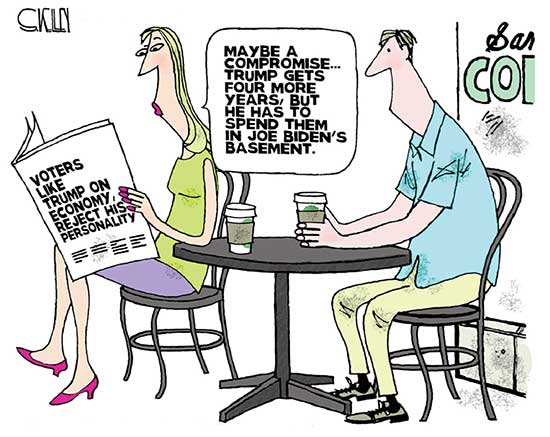Features
Jeffrey Sachs Condemns Trump Admin. for ‘Thuggery & Lawlessness’

POPULATION CONTROL ADVOCATE AT VATICAN MEET . . .
by Selvam Canagaratna
“Over-population is a phenomenon connected with the survival of the unfit, and it is a mechanism which has created conditions favourable to the survival of the unfit and the elimination of the fit.”
– William Ralph Inge, ‘The Dilemma of Civilisation’.
American economist and Population Control Advocate, Jeffrey Sachs, used the Vatican’s Pontifical Academy of Social Sciences to launch a scathing attack on the Trump administration, accusing it of threatening multilateralism by bullying other nations and saying President Trump’s possible re-election in November would be “absolutely dangerous.”
The report is by Edward Pentin, Rome correspondent for the National Catholic Register, who is also the author of The Next Pope — The Leading Cardinal Candidates, to be published this month by Sophia Institute Press. Pentin has also reported on the Holy See and the Catholic Church for a number of other publications including Newsweek, Newsmax, Zenit, The Catholic Herald, and The Holy Land Review, a Franciscan publication specializing in the Church and the Middle East.
Jeffrey Sachs, a regular participant at the academy and a papal adviser on sustainable development despite his support for population control, told delegates at the Vatican conference on fostering new economic forms of solidarity that the Trump administration is operating with “complete lawlessness,” blocking “every multilateral initiative” since 2017.
To the visible delight of Bishop Marcelo Sanchez Sorondo, chancellor of the Pontifical Academy of Sciences, who was seated next to him, Sachs said multilateralism is not under threat per se in most of the world, but it is “under threat because of the United States.”
The chief architect of the UN’s Sustainable Development Goals and a strong supporter of Democratic presidential candidate Bernie Sanders, who wrote the foreword to Sachs’ 2017 book Building the New American Economy: Smart, Fair, and Sustainable, Sachs told the delegates that the US used to be “the predominant economic and technological power for decades” but added this was “no longer the case.”
He argued that to maintain the historical primacy of the United States on the world stage, the Trump administration has bullied other nations into supporting its policies using economic and political means. “It’s pure politics top to bottom which has nothing to do with anything meritorious other than the idea of temporary advantage in some geopolitical contests and contexts,” he said.
The United States’ unilateral actions are “thuggery, a complete violation of every international rule,” he continued in an extraordinary outburst, adding: “This is truly what we are facing. I’m sorry to say it, it’s my country and I’m not very happy to say it, but it’s an imperial power in decline and it’s a dangerous country right now and it will be absolutely dangerous if Trump wins re-election.”
Sachs, who has also been allied with radical pro-abortion billionaire George Soros and works with the ardently pro-contraception Bill and Melinda Gates Foundation, went on to criticize the US for “dismantling the international system” and urged those running global institutions not to be “cowed by bullying” by the current administration, and what he called “relentless US daily pressure on multilateralism.”
Although the pontifical academy has hosted many political figures in the past including President Trump’s former strategist Steve Bannon in 2014 and Sanders in 2016, Sachs’ words were unusually partisan for the academy, which normally eschews such politically charged speeches in favour of more academic reflections.
The other interventions, including from Spain’s socialist Deputy Prime Minister and France’s Finance Minister, were slanted toward a leftist or globalist perspective, but mostly avoided partisan politics. Instead they dwelled on how to grow a green economy to combat climate change, reform capitalism to make it more equitable, and to restore the ethical foundations of economics.
Sachs spoke about the latter in his earlier keynote address of the conference, explaining how economics had moved from a basis of human dignity to a libertarian view and “how destructive this has been.”
“It’s time for a restoration for a deeper philosophical basis for economics based on human dignity and the Church’s social teaching,” he told the Register during a break.
Asked whether by the Church’s teaching on human dignity he meant respect for life from conception to natural death, Sachs replied: “I mean everybody’s economic needs should be met, that people should have the dignity of work that the poor should be helped, that this is about the core ideas of human wellbeing.”
Asked if by helping the poor he meant wealth creation, he said: “Jesus said, ‘He who feeds the least among me, feeds me.’ He was talking about helping the poor. When Aristotle talks about politics or the common good, he’s talking about a society in which people afforded dignity.
“We know why our current system leads to massive inequalities, leaving billions of people behind,” he said, “and so this is about public policy, about individual ethics, social organization. It’s about our attitudes towards others.”
Earlier in the day, Pope Francis unexpectedly joined the conference and addressed the participants, most of whom came from Latin America and included Argentina’s Finance Minister.
In his speech, Pope Francis called on the architects of the global financial system to reduce rising income inequality by prioritizing the needs of the poor who are left behind by what he termed ‘the globalization of indifference’.